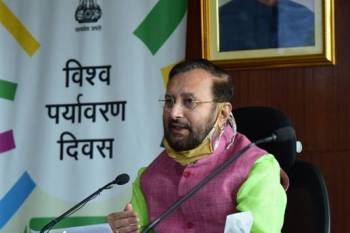Urban Forest will revive the age old tradition of village forest in cities, says Prakash Javadekar
NEW DELHI, 5 June 2020: On the occasion of World Environment Day, Indian environment minister Prakash Javadekar announced the implementation of the Nagar van scheme to develop 200 Urban Forests across the country in next five years with a renewed focus on people’s participation and collaboration between Forest Department, Municipal bodies, NGOs, Corporates and local citizens.
World Environment Day (WED) is celebrated on 5 June every year. Ministry of Environment, Forest & Climate Change celebrates WED focusing on the theme declared by United Nation’s Environment Programme (UNEP) and organizes several events.
This year’s theme is ‘Biodiversity’. In view of the prevalent situation due to COVID-19 pandemic the ministry held virtual celebrations of World Environment Day on this year’s theme with focus on Nagar Van (Urban Forests).
Releasing a brochure on the best practices on Urban Forests and announcing the Nagar Van scheme, Javadekar said that these forests will work as lungs of the cities and will primarily be on the forest land in the City or any other vacant land offered by local urban local bodies.
If we protect nature, nature protects us
Stressing on this year's theme i.e. ‘Time for Nature’ with special focus on biodiversity, Javadekar said “thumb rule is that if we protect nature, nature protects us” .
A film was played during the Environment Day Celebrations today which narrates how the initiatives of Punaikars along with Forest Department and local body has converted 16.8 ha of a barren hill into green forests.
Today, the forest is rich in biodiversity with 23 plant species, 29 bird species, 15 butterfly species, 10 reptiles and 3 mammal species. This Urban Forest project is now helping maintain ecological balance, serving both environmental and social needs. The Warje Urban Forest is now a role model for the rest of the country.
Stressing on this year’s focus on Biodiversity the minister said,“India has 8 percent of world's biodiversity, despite having many constraint like only 2.5 % of the world's landmass, has to carry 16% of human as well as cattle population and having only 4% of fresh water sources; the mega biodiversity that we have is the result of Indian ethos which is to be in sync with the nature.”
India the only country where trees are worshipped
Highlighting the Indian culture, Javadekar said that “India is probably the only country where trees are worshipped, where animals, birds and reptiles are worshipped and this is the respect Indian society places for environment. We had a very important tradition of village forest since ages, now this new scheme of urban forest will fill up the gap because urban areas have Gardens but very rarely forests; With this activity of creating urban forest we will also create additional carbon sink, the minister said.
Tree plantation, soil moisture conservation core for biodiversity
Also present on the occasion minister of state Babul Supriyo, emphasized on Tree plantation and soil moisture conservation works as a core strategy for biodiversity conservation in the country.
He emphasised that to address the problems of soil degradation, siltation and reduced water flow in the river basins and everyone has to work collectively.
The event also saw virtual participation from Executive Director, United Nation Convention to Combat Desertification, (UNCCD), Ibrahim Thiaw and Executive Director United Nation Environment Programme(UNEP), Ms. Inger Andersen.
We need nature more than nature needs us, says UNCCD executive director
The UNCCD executive director, Thaw said that “Is it not time, that we realise that we need nature more than nature needs us, if at all. Is it not time, that we have the humility to rethink and redefine our relationship with nature. Perhaps, it is time for humanity to have a new social contract for nature.”
Stressing on this year’s theme Ms. Andersen said that actions for nature means a lower risk of future pandemics, achieving the sustainable development goal, slowing climate change, healthier lives, better economies, being able to cherish that breath of fresh air or walk in the woods protecting life itself. In a post COVID world, we need to build back better, we need to protect the planet to protect ourselves.
Minister (Forest), Government of Maharashtra, Sanjay Rathod, newly appointed Secretary, Ministry of Environment, Forest and Climate Change ,R P Gupta, DG Forest& Special Secretary, Sanjay Kumar,Anand Deshpande of Persistent System and Dr. Vinita Apte, Director, TERRE Policy center, Pune also participated in the event and shared their words of wisdom.
India is endowed with rich biodiversity having several species of animals and plants and hosts 4 of the 35 global bio-diversity hotspots containing several endemic species.
However, increasing population, deforestation, urbanisation and industrialisation have put our natural resources under tremendous pressure causing loss of biodiversity.
Biodiversity is vital for survival of all life form on this planet and is a key to providing various ecological services. Biodiversity conservation has traditionally been considered confined to remote forest areas but with increasing urbanisation a need has arisen to safeguard and save biodiversity in urban areas also.
Urban forest is the best way to bridge this gap. The Ministry of Environment, Forest & Climate Change has therefore, appropriately adopted Nagar van as the theme of WED celebrations 2020 to promote and conserve biodiversity in urban landscapes.




















